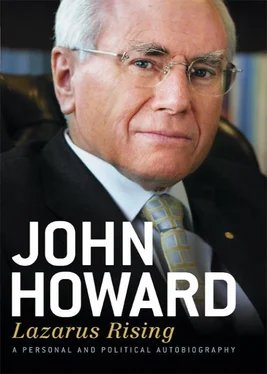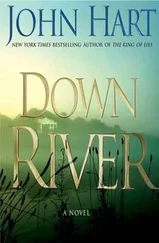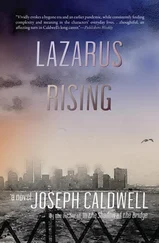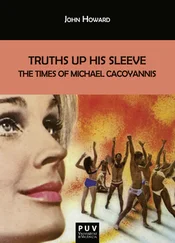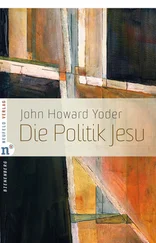Although my parents were united in their commitment to the Liberal Party, I suspect that they voted differently on one important occasion, and that was the referendum, held on 22 September 1951, to ban the Communist Party of Australia.
At that time the Cold War was intense, the communists had taken over in China only two years before, and Soviet communism was seen as a real threat to the peace of the world. On top of this, communist officials held many senior positions in Australian trade unions. The Communist Party in Australia was regarded by many as a subversive organisation because it sought the overthrow of the economic and social order under which Australians then lived. Menzies had secured passage of a law which declared the Communist Party an illegal organisation.
The validity of that law was challenged, and the High Court of Australia declared the law unconstitutional, as being beyond the power of the federal parliament to enact. Menzies’ response had been to propose a referendum asking the people to agree to change the Constitution of the Commonwealth to give the federal parliament the power to pass the law which had previously been ruled invalid. The referendum campaign provoked intense debate and division. Menzies and his followers argued that the free world was engaged in a life-and-death struggle against communism, and Australia should not tolerate what he believed amounted to a fifth column in our country. Against that, many argued that the proposal violated free speech, and that it was never desirable to drive political movements underground.
This debate spilled over into the kitchen of our household. I recall quite clearly my mother’s strong reservations about the additional power being sought by Menzies. One night she said, ‘Menzies would be a bit of a dictator, if he had his way.’ My father would have none of this. This was the one particularly short and sharp exchange on the subject, and after that I heard nothing more. Knowing my mother’s determination once she had made up her mind, I am sure that she ended up voting against the proposal. If such loyal Liberals as my mother had reservations, then it is not surprising that the referendum went down.
This incident said a lot about my parents. They were both politically and socially conservative, but that was the result of their separate convictions. In no way did my mother automatically embrace the views of my father. Although in so many ways Mum fulfilled the traditional homemaker role typical of the times, she was a woman who held fiercely to her own independent opinions. Like my father, she had a well-developed interest in politics, and for years after Dad’s death she and I would have quite lengthy discussions about political events in Australia in the 1920s and ‘30s.
I became totally absorbed in the Petrov Affair. Vladimir Petrov had been the third secretary in the Soviet Embassy in Canberra (but in reality a low-level spy) when suddenly, in April 1954, he defected and sought political asylum in Australia, which was granted in return for Petrov providing details of Soviet spying in Australia. It was a dramatic event, complete with KGB agents arriving to take Mrs Petrov back to Moscow. There were wild scenes at Sydney Airport as, seemingly against her will, she was taken on board an aircraft, Soviet-bound. On instructions from the Government, police intervened when the plane stopped for refuelling at Darwin, and having satisfied themselves that she did not wish to return to Moscow, relieved her KGB escort. The agents returned empty-handed to an uncertain welcome in Russia, and Mrs Petrov rejoined her husband. They spent the rest of their lives in Australia.
Menzies swiftly established a Royal Commission to examine the extent of Soviet espionage in Australia. This happened on the eve of the 1954 federal election. When the ALP lost that election quite narrowly, its leader, Dr Bert Evatt, convinced himself that the whole Petrov Affair had been a giant conspiracy, orchestrated by Bob Menzies to damage the ALP by raising the communist issue on the eve of the election. As a barrister, Evatt had appeared before the commission, representing people who had previously worked for him. He attacked the Royal Commissioners who, ultimately, withdrew his right to appear.
Dad and I both listened in astonishment as Evatt told parliament that he had written to the Soviet Foreign Minister, Molotov, asking whether or not Petrov had been a Russian spy. Molotov had written back denying that Petrov had spied for the Soviet Union. Evatt actually believed Molotov. This extraordinary incident did immense damage to Evatt’s credibility, and was a clear sign of the paranoia that he had developed as a result of losing the 1954 election. It was a forewarning to many in his party of the erratic behaviour of his which was to come, and which contributed so much to the momentous split in the Labor Party in 1955.
My parents held conservative foreign policy views. They were staunchly anti-communist and saw Britain and America, in that order, as our real friends. Whenever we talked history, and this would have been in the 1950s, when memories of World War II were still relatively fresh, I was left in no doubt that my parents felt that the appeasement policies of the ‘30s, espoused by Neville Chamberlain and supported, to varying degrees, by most Australian leaders, including Robert Menzies and John Curtin, had been wrong.
Mum and Dad, especially the latter, were ardent admirers of Winston Churchill. I was born on 26 July 1939, at a time when Churchill was still out of favour, regarded as too belligerent and scorned by many in the British Establishment as temperamentally unsuited for leading the nation. Few thought that just 10 months later the House of Commons would, in desperation, turn to him. My parents gave me Winston as a second Christian name because my father had strongly supported Churchill’s opposition to appeasement and shared his forebodings about its consequences. All my life, I have taken quiet pride in the fact that my own father was on the side of history in his attitudes to the 1930s, and I have a second name and a birth date to prove it.
I have often wondered how it was that I developed such an intense interest in politics so early, and why it was that it became such a lifelong passion. A big reason was that politics was talked about at home from as long as I can remember. Being the youngest, I was exposed to politics from an early age, with my parents being willing to explain issues and never hustling me away because I was too young. My parents often disagreed with actions of governments, but were not cynical about them and always encouraged in their children respect for society’s institutions. I was brought up to believe that governments could do good things, if only they were comprised of the right people.
These were all influences which meant that I saw politics as good public service, as a way in which change could be achieved. That was important, but not as crucial as my seeing politics as an arena in which ideas and values could be debated, contested and adopted. That was the foundation of my lifelong view that politics is, more than anything else, a battle of ideas. Not only did I enthuse about the contest of ideas, I revelled in the experience of the contest itself. Debating, arguing, testing ideas about how society could be improved energised me.
The influence of parents on their children’s political views is a fascinating study. I embraced most of my parents’ political attitudes, particularly their support for private enterprise and especially of the small-business variety. Mum and Dad were often quite tough on people who worked for the Government. They thought that people in the private sector did all the work. In politics, I encountered numerous public servants who worked very hard indeed.
Читать дальше
